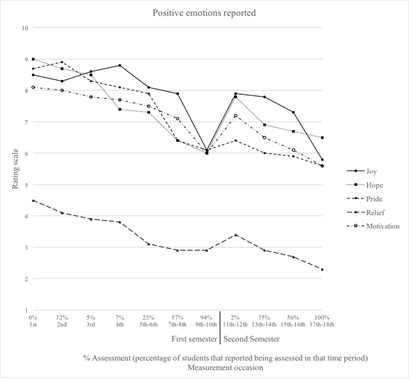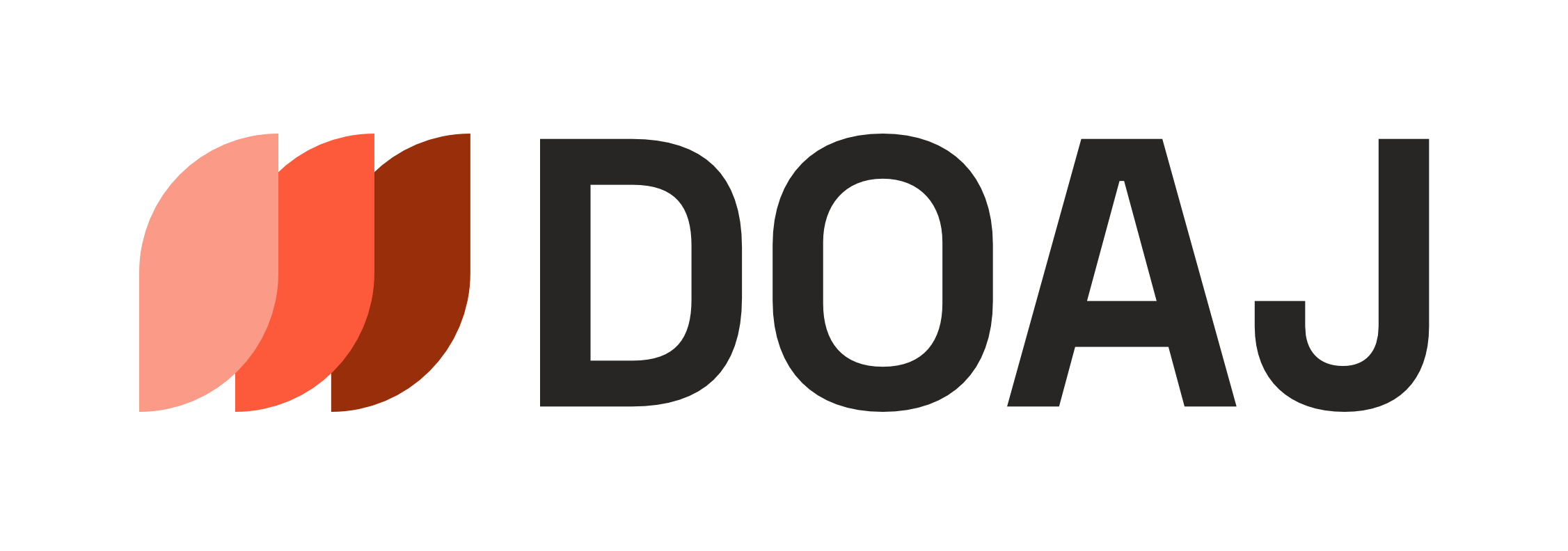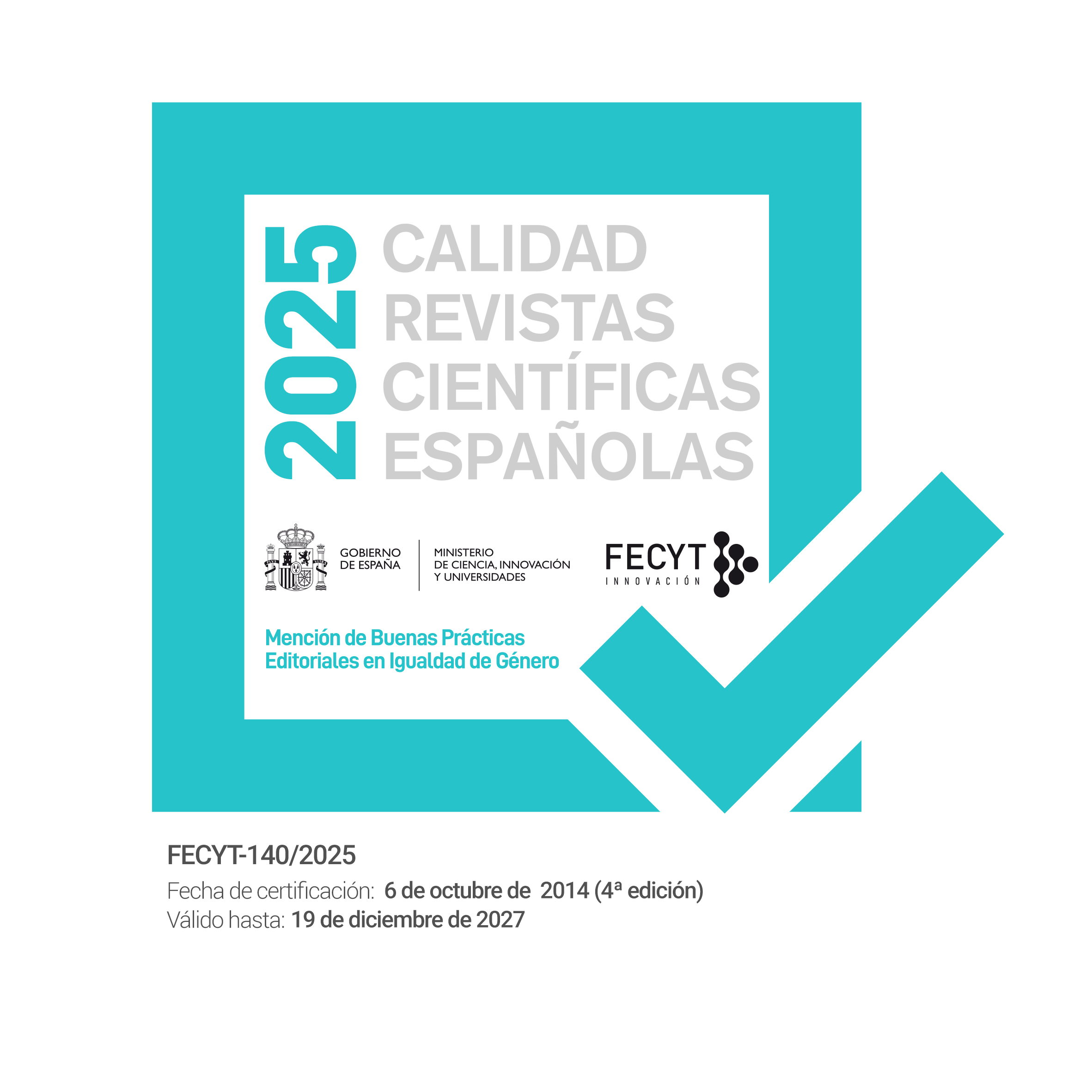Transition to higher education and assessment: a one year longitudinal study
DOI:
https://doi.org/10.5944/educxx1.29870Keywords:
transition to higher education, higher education adaptation, classroom assessment, self-regulated learning, emotion and motivationAbstract
Higher education students need to be more autonomous when they change to this new learning environment. This is one of the reasons why many students find the transition to higher education a challenging experience, also shown by the high dropout rate in the first year of higher education. Researchers in this area have pointed out different academic, sociodemographic, psychological, and sociocultural variables that may explain students’ adaptation to higher education. In this line of investigation, there have been calls for more longitudinal research to understand how students adapt to their arrival at the university. In this longitudinal study, 148 participants filled out a learning diary/survey on a weekly and bi-weekly basis during their first university year, reporting their satisfaction, challenges, emotions, motivation, and learning strategies. Three main conclusions can be extracted from the data. First, satisfaction levels and challenges fluctuated throughout the year, showing that students experience their transition through different phases and that there are variations within the year. Second, assessment activities (e.g., exams) are the major emotional and motivational triggers decreasing positive emotions and increasing negative emotions. And third, participants reported the use of strategies mostly for processing or memorizing the content in contrast to an extremely low number of more advanced self-regulatory strategies. We recommend some actions to improve students’ transition to higher education, such as reconsidering assessment practices and designing intervention programs to help students in this new environment.
Downloads
References
American Psychological Association. (n.d.). Valence. In APA dictionary of psychology. https://dictionary.apa.org/valence
Brahm, T., Jenert, T., & Wagner, D. (2017). The crucial first year: A longitudinal study of students’ motivational development at a Swiss Business School. Higher Education, 73, 459–478. https://doi.org/10.1007/s10734-016-0095-8
Christie, H., Barron, P., & D’Annunzio-Green, N. (2013). Direct entrants in transition: becoming independent learners. Studies in Higher Education, 38(4), 623–637. https://doi.org/10.1080/03075079.2011.588326
Christie, H., Tett, L., Cree, V., McCune, V., & Hounsell., J. (2008). ‘A real rollercoaster of confidence and emotions’: Learning to be a university student. Studies in Higher Education, 33(5), 567–581. https://doi.org/10.1080/03075070802373040
Cliff, A. F. (2000). Dissonance in first-year students’ reflections on their learning. European Journal of Psychology of Education, 15(49). https://doi.org/10.1007/BF03173166
Coertjens, L., Brahm, T., Trautwein, C., & Lindblom-Ylänne, S. (2017). Students’ transition into higher education from an international perspective. Higher Education, 79(3), 357–369. https://doi.org/10.1007/s10734-016-0092-y
Coertjens, L., Donche, V., De Maeyer, S., van Daal, T., & Van Petegem, P. (2017). The growth trend in learning strategies during the transition from secondary to higher education in Flanders. Higher Education, 73(3), 499–518. https://doi.org/10.1007/s10734-016-0093-x
Delaney, A. M. (2004). Ideas to enhance higher education’s impact on graduates’ lives: Alumni recommendations. Tertiary Education and Management, 10(2), 89–105. https://doi.org/10.1023/B:TEAM.0000023839.21429.63
Deslauriers, L., McCarty, L. S., Miller, K., Callaghan, K., & Kestin, G. (2019). Measuring actual learning versus feeling of learning in response to being actively engaged in the classroom. Proceedings of the National Academy of Sciences, 116(39), 19251–19257. https://doi.org/10.1073/pnas.1821936116
Ellison, L., & Jones, D. (2019). First year law students: The impact of assessment type on attainment. Assessment & Evaluation in Higher Education, 44(2), 283–293. https://doi.org/10.1080/02602938.2018.1496398
Estévez, I., Rodríguez, S., Valle, A., Regueiro, B., & Piñeiro, I. (2016). Incidencia de las metas académicas del alumnado de secundaria en su gestión motivacional. Aula Abierta, 44(2), 83–90. https://doi.org/10.1016/j.aula.2016.03.001
Gale, T., & Parker, S. (2014). Navigating change: a typology of student transition in higher education. Studies in Higher Education, 39(1), 734-753. https://doi.org/10.1080/03075079.2012.721351
Harvey, L., Drew, S., & Smith, M. (2006). The first-year experience: a review of literature for the Higher Education Academy. The Higher Education Academy.
Hillman, K. (2005). The first year experience: The transition from secondary school to university and TAFE in Australia. Australian Council for Education Research.
Kantanis, T. (2000). The role of social transition in students’ adjustment to the first-year of university. Journal of Institutional Research, 9(1), 100–110. https://doi.org/10.4236/psych.2017.88081
Koivuniemi, M., Panadero, E., Malmberg, J., & Järvelä, S. (2017). Higher education students’ learning challenges and regulatory skills in different learning situations [Desafíos de aprendizaje y habilidades de regulación en distintas situaciones de aprendizaje en estudiantes de educación superior]. Infancia y Aprendizaje, 40(1), 19–55. https://doi.org/10.1080/02103702.2016.1272874
Krause, K. L., & Coates, H. (2008). Students’ engagement in first-year university. Assessment & Evaluation in Higher Education, 33(5), 493–505. https://doi.org/10.1080/02602930701698892
Kyndt, E., Donche, V., Coertjens, L., van Daal, T., Gijbels, D., & Van Petegem, P. (2019). Does self-efficacy contribute to the development of students’ motivation across the transition from secondary to higher education? European Journal of Psychology of Education, 34(2), 457–478. https://doi.org/10.1007/s10212-018-0389-6
Lipnevich, A. A., Panadero, E., Gjicali, K., & Fraile, J. (2021). What’s on the syllabus? An analysis of assessment criteria in first year courses across US and Spanish universities. Educational Assessment, Evaluation and Accountability, 33, 675–699. https://doi.org/10.1007/s11092-021-09357-9
Lowe, H., & Cook, A. (2003). Mind the gap: Are students prepared for higher education? Journal of Further and Higher Education, 27(1), 53–76. https://doi.org/10.1080/03098770305629
Moreau, M. P., & Leathwood, C. (2006). Balancing paid work and studies: Working (-class) students in higher education. Studies in Higher Education, 31(1), 23–42. https://doi.org/10.1080/03075070500340135
Niculescu, A. (2015). Hidden in plain sight: Capturing freshmen emotional experiences and their effects on performance at university. Maastricht University.
Noyes, D., Donche, V., Coertjens, L., & Van Petegem, P. (2017). Transitions to higher education: Moving beyond quantity. In E. Kyndt, V. Donche, K. Trigwell, & S. Lindblom-Ylänne (Eds.), Higher Education transitions. Theory and research (pp. 3–12). Routledge.
Pekrun, R., Goetz, T., Titz, W., & Perry, R. P. (2002). Academic emotions in students’ self-regulated learning and achievement: A program of qualitative and quantitative research. Educational Psychologist, 37(2), 91–105. https://doi.org/10.1207/S15326985EP3702_4
Quinn, J. (2010). Learning communities and imagined social capital: Learning to belong. Continuum.
Richardson, M., Abraham, C., & Bond, R. (2012). Psychological correlates of university students’ academic performance: A systematic review and meta-analysis. Psychological Bulletin, 138(2), 353–387. https://doi.org/10.1037/a0026838
Rovers, S. F. E., Stalmeijer, R. E., van Merriënboer, J. J. G., Savelberg, H. H. C. M., & de Bruin, A. B. H. (2018). How and why do students use learning strategies? A mixed methods study on learning strategies and desirable difficulties with effective strategy users. Frontiers in Psychology, 9, 2501. https://doi.org/10.3389/fpsyg.2018.02501
Samuelstuen, M. S., & Bråten, I. (2007). Examining the validity of self-reports on scales measuring students’ strategic processing. British Journal of Educational Psychology, 77(2), 351–378. https://doi.org/10.1348/000709906X106147
Smith, J. S., & Wertlieb, E. C. (2005). Do first-year college students’ expectations align with their first-year experiences? NASPA Journal, 42(2), 153–174.
Stupnisky, R. H., Perry, R. P., Hall, N. C., & Guay, F. (2012). Examining perceived control level and instability as predictors of first-year college students’ academic achievement. Contemporary Educational Psychology, 37(2), 81–90. https://doi.org/10.1016/J.CEDPSYCH.2012.01.001
Tam, M. (2002). University impact on student growth: A quality measure. Journal of Higher Education Policy and Management, 24(2), 211–218. https://doi.org/10.1080/1360080022000013527
Thomas, L. (2012). Building student engagement and belonging in Higher Education at a time of change: a summary of findings and recommendations from the What Works? Student Retention & Success programme. Higher Education Academy.
Thomas, L., & Quinn, J. (2007). First generation entry into higher education: An international perspective. Open University Press.
Thomas, T., Jacobs, D., Hurley, L., Martin, J., Maslyuk, S., Lyall, M., & Ryan, M. (2019). Students’ perspectives of early assessment tasks in their first-year at university. Assessment & Evaluation in Higher Education, 44(3), 398–414. https://doi.org/10.1080/02602938.2018.1513992
Tinto, V. (2012). Completing college: Rethinking institutional action. The University of Chicago Press.
van Herpen, S. G. A., Meeuwisse, M., Hofman, W. H. A., Severiens, S. E., & Arends, L. R. (2017). Early predictors of first-year academic success at university: pre-university effort, pre-university self-efficacy, and pre-university reasons for attending university. Educational Research and Evaluation, 23(1–2), 52–72. https://doi.org/10.1080/13803611.2017.1301261
Wagner, D., & Brahm, T. (2017). Fear of academic failure as a self-fulfilling prophecy. In E. Kyndt, V. Donche, K. Trigwell, & S. Lindblom-Ylänne (Eds.), Higher Education transitions. Theory and research (pp. 13–30). Routledge.
Yorke, M., & Longden, B. (2007). The first-year experience in higher education in the UK: Final report. Higher Education Academy.
Zhou, J., Zhao, K., & Dawson, P. (2020). How first-year students perceive and experience assessment of academic literacies. Assessment & Evaluation in Higher Education, 45(2), 266–278. https://doi.org/10.1080/02602938.2019.1637513

Downloads
Published
How to Cite
Issue
Section
License
Copyright (c) 2022 Ernesto Panadero, Juan Fraile, Daniel García-Pérez

This work is licensed under a Creative Commons Attribution-NonCommercial 4.0 International License.
Educación XX1 is published under a Creative Commons Attribution-NonCommercial 4.0 (CC BY-NC 4.0)










